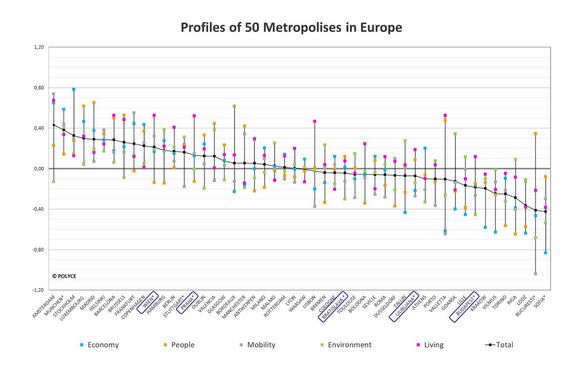Bratislava, Budapest, Ljubljana, Praha and Wien form a Central European quintet of metropolises with exceptionally high living standards. Beyond this commonality each of the five metropolises is showing a distinct profile in economy, environment, mobility and human capital which gives them each a specific role to play as potential generator of metropolitan development within the Central European urban system.
POLYCE, an ESPON research project
- brings together universities and stakeholders from these five metropolises,
- sets up to analyse the cities’ future competitive and cooperative potentials among each other and towards other metropolises, and
- draws an up-to-date picture of the preconditions for smart urban development in Central Europe bringing forward in a comprehensive but critical way the possibilities and strategic options for a cohesive development.
POLYCE
- analyses the strategic position of the five Central European capital cities Bratislava, Budapest, Ljubljana, Prague, and Vienna in Europe,
- describes and assesses the relations between them, and
- shows specific ways of metropolitan development strengthening competitive and inclusive development in a smart and balanced way.
Based on a new definition of metropolitan areas empirical research in POLYCE concentrates on
- the detection and meaning of distinct pre-conditions for metropolitan growth
- the description and discussion of polycentricity for metropolitan development
- the elaboration of metropolitan profiles as a starting point for strategic endeavours of positioning respective metropolises in the European urban system.
On the basis of the empirical evidence POLYCE facilitated stakeholder discussions in the five metropolises to derive policy recommendations as part of a metropolitan agenda. Based on the discussion of about 150 stakeholders acting in different fields of urban development, general development paths are proposed for each metropolitan area taking into account current challenges. An evidence-based Metropolitan Agenda for smart development is elaborated for each city considering its preconditions and stakeholders’ assessments.
In a similar way POLYCE engaged stakeholders in discussions aiming at the formulation of suggestions for promising future activities for the five metropolises in the context of the Central European Danube Region. Elaborated strategic endeavours are focusing on aspects of territorial cohesion within the Central European Danube Region explicitly. Enhancing polycentric relations will help managing processes of metropolisation and related metropolitan growth. A Central European Development Agenda therefore emphasizes activities strengthening polycentric strategic/institutional or functional cooperation in a bi- or multilateral way focussing on the enhancement of relational capital, improvement of physical infrastructure and an intensified information exchange through a more structured elaboration of information on metropolitan development and corresponding activities within and across all metropolises.
Event
The City of Vienna and the Vienna University of Technology are pleased to invite you to the final event of the ESPON research project POLYCE on 1 June 2012 at the Kuppelsaal of the Vienna University of Technology.
The future opportunities and specific potentials of a Central European metropolitan network will be discussed at the event based on the results of the research project POLYCE. Politicians, scientists, stakeholders, and experts from the five project cities Bratislava, Budapest, Ljubljana, Prague, and Vienna will exchange their ideas and visions on metropolitan development in Central Europe.
<link file:24499 _blank pdf-link>Programme
